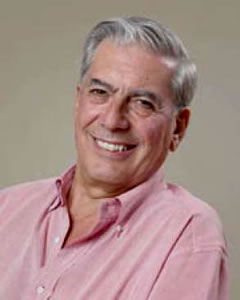Nobelprijs literatuur voor Mario Vargas Llosa
De Nobelprijs voor de Literatuur is dit jaar toegekend aan de Peruaanse schrijver en oud-politicus Mario Vargas Llosa. Dat heeft de Zweedse Academie donderdag bekendgemaakt. Hij is de eerste Peruaan die de prijs heeft gekregen. De laatste Spaanstalige schrijver aan wie de prijs werd toegekend, was in 1990 de Mexicaan Octavio Paz. De prijs, waaraan een bedrag van 10 miljoen Zweedse kronen (1,5 miljoen euro) is verbonden is aan Vargas Llosa toegekend voor ,,de manier waarop hij machtsstructuren in kaart brengt en zijn scherpzinnige beelden van het verzet, de opstandigheid en de nederlaag van het individu.” Vargas Llosa is de elfde Spaanstalige winnaar van de Nobelprijs voor de Literatuur. De eerste was de Spanjaard José Echegaray in 1904. Andere Spaanstalige winnaars waren onder anderen Pablo Neruda (1971) en Gabriel Garcia Márquez (1982). Mario Vargas Llosa in Arequipa werd geboren op 28 maart 1936. Zie ook mijn blog van 28 maart 2007 en ook mijn blog van 28 maart 2008.en ook mijn blog van 28 maart 2009 en eveneens mijn blog van 28 maart 2010.
Uit: The Feast of the Goat (Vertaald door Edith Grossman)
“But the colonial city has not been modernized, and neither has Gazcue, her neighborhood. And she is absolutely certain her house has hardly changed at all. It must be the same, with its small garden, old mango tree, and the flamboyán with red flowers bending over the terrace where they used to have lunch outdoors on weekends; the sloping roof and the little balcony outside her bedroom, where she would go to wait for her cousins Lucinda and Manolita, and, during that last year, 1961, spy on the boy who rode past on his bicycle, watching her out of the comer of his eye and not daring to speak. Would it be the same inside? The Austrian clock that sounded the hours had Gothic numerals and a hunting scene. Would her father be the same? No. You’ve seen him failing in the photos sent to you every few months or years by Aunt Adelina and other relatives who continued to write even though you never answered their letters.
She drops into an armchair. The rising sun penetrates to the center of the city; the dome of the National Palace and its pale ocher walls sparkle gently under a curve of blue. Go now, soon the heat will be unbearable. She closes her eyes, overcome by a rare inertia, for she is accustomed to always being active and not wasting time in what, since her return to Dominican soil, has occupied her day and night: remembering. “This daughter of mine is always working, she even repeats her lessons when she’s asleep” That’s what Senator Agustín Cabral, Minister Cabral, Egghead Cabral used to say about you when he boasted to his friends about the girl who won all the prizes, the student the sisters always held up as an example. Did he boast to the Chief about Urania’s scholarly achievements? “I’d like so much for you to know her, she has won the Prize for Excellence every year since she enrolled at Santo Domingo. It would make her so happy to meet you and shake your hand. Urania prays every night for God to protect that iron health of yours. And for Dona Julia and Dona María as well. Do us this honor. The most loyal of your dogs asks, begs, implores you. You can’t refuse: receive her. Excellency! Chief!”
Do you despise him? Do you hate him? Still? “Not anymore,” she says aloud. You wouldn’t have come back if the rancor were still sizzling, the wound still bleeding, the deception still crushing her, poisoning her, the way it did in your youth, when studying and working became an obsessive defense against remembering. Back then you did hate him. With every atom of your being, with all the thought and feeling your body could hold. You wanted him to suffer misfortunes, diseases, accidents. God granted your wish, Urania. Or rather, the devil did. Isn’t it enough that the cerebral hemorrhage brought him a living death? A sweet revenge that he has spent the last ten years in a wheelchair, not walking or talking, depending on a nurse to eat, lie down, dress, undress, trim his nails, shave, urinate, defecate? Do you feel avenged? “No.”

Mario Vargas Llosa (Arequipa, 28 maart 1936)
